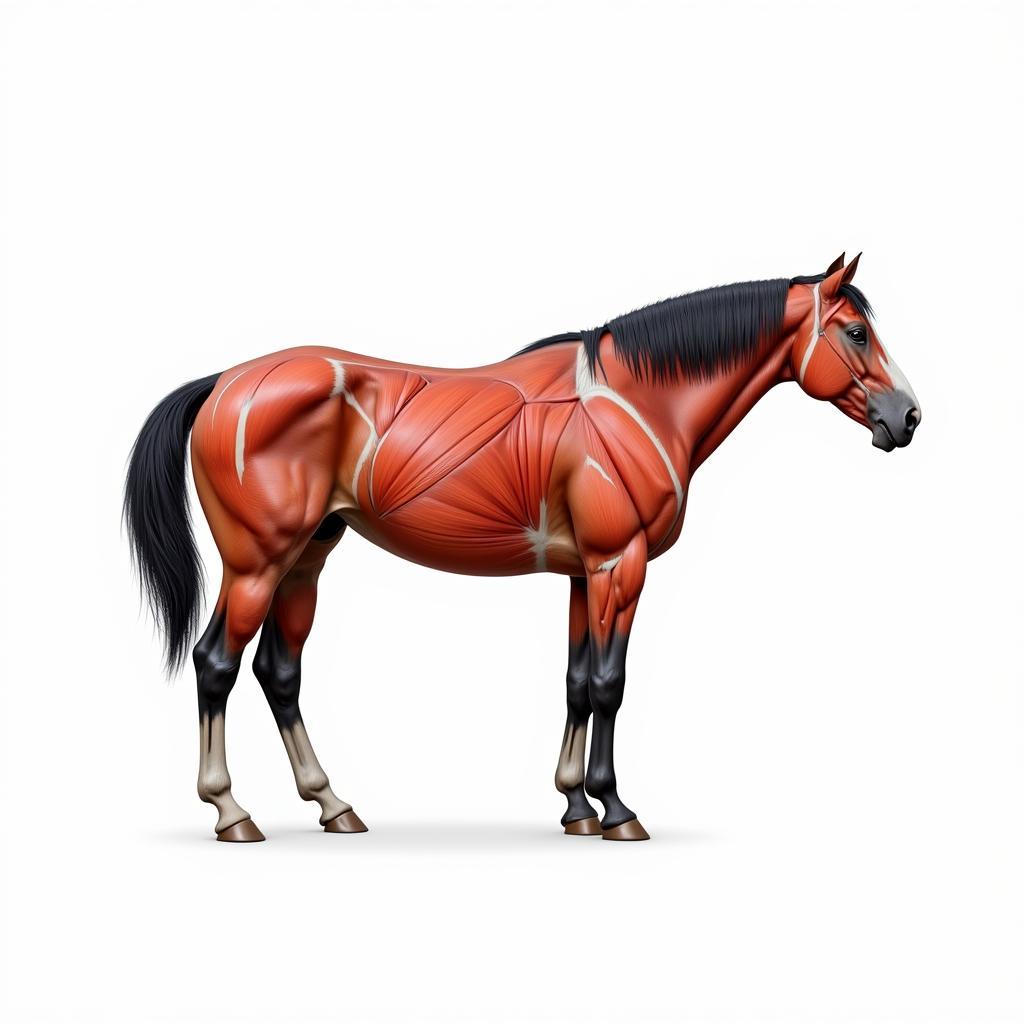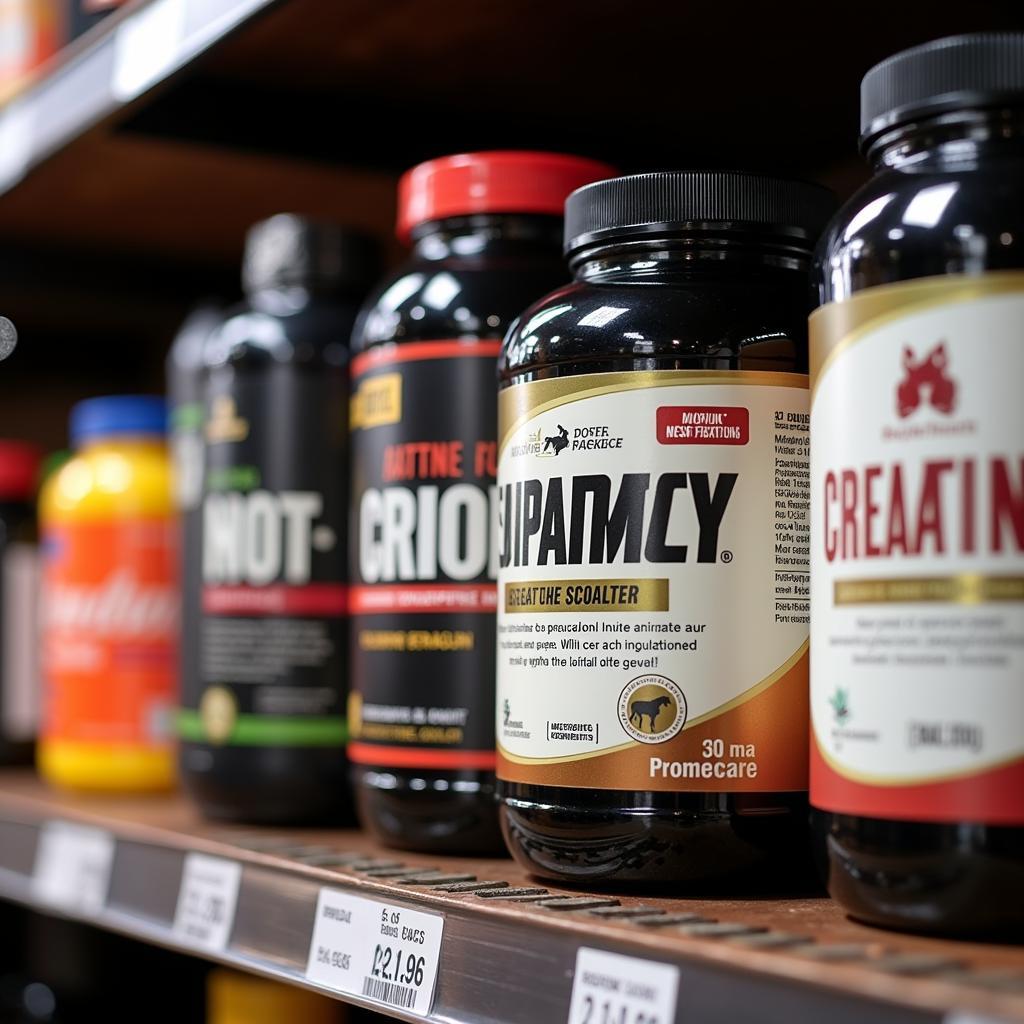Creatine For Horses has been a hot topic in the equine community for a while now. As horse owners, we’re always looking for ways to improve our horses’ performance, muscle mass, and overall health. But is creatine all it’s cracked up to be, or is it just another fad supplement? This article dives deep into the science behind creatine for horses, its potential benefits, and whether it’s right for your equine companion.
 Horse Muscle Anatomy
Horse Muscle Anatomy
Understanding Creatine and its Role in Equine Performance
Creatine is a naturally occurring compound found in muscle cells of humans and animals, including horses. It plays a crucial role in energy production, particularly during short bursts of intense activity like sprinting or jumping. When muscle cells need quick energy, creatine phosphate donates a phosphate molecule to ADP (adenosine diphosphate) to create ATP (adenosine triphosphate), the primary energy currency of cells.
 Creatine Phosphate and ATP Cycle in Muscle Cells
Creatine Phosphate and ATP Cycle in Muscle Cells
So, how does this translate to equine performance?
- Enhanced Power and Speed: Supplementing with creatine can increase the availability of creatine phosphate in muscle cells, potentially leading to improved power output and faster sprint times in horses.
- Increased Muscle Mass: Creatine supplementation may promote muscle protein synthesis, resulting in increased muscle mass and strength over time, particularly in horses undergoing intense training.
- Improved Recovery: Creatine might reduce muscle damage and inflammation associated with exercise, contributing to faster recovery times and reduced muscle soreness.
Is Creatine Right for Your Horse?
While the potential benefits of creatine for horses seem promising, it’s crucial to consult with your veterinarian before adding any new supplements to your horse’s diet. Factors to consider include:
- Horse’s Age and Breed: Young, growing horses and certain breeds might benefit more from creatine supplementation than others.
- Training Intensity and Discipline: Horses participating in high-intensity disciplines requiring bursts of energy, such as racing, jumping, or eventing, might see more noticeable effects from creatine.
- Overall Health Status: It’s essential to ensure your horse is healthy and free from any underlying medical conditions before starting creatine supplementation.
Potential Risks and Considerations
Like any supplement, creatine can have potential side effects, although they are generally considered rare and mild in horses. Some possible side effects might include:
- Digestive Upset: In some cases, creatine supplementation might cause mild digestive discomfort, such as loose stools or gas.
- Electrolyte Imbalance: Creatine can impact electrolyte balance, so providing adequate access to water and electrolytes is crucial, especially during hot weather or intense exercise.
- Individual Sensitivities: Horses, like humans, can have individual sensitivities to supplements. It’s always best to start with a low dose and gradually increase it while monitoring your horse for any adverse reactions.
Choosing the Right Creatine Supplement for Your Horse
If you and your veterinarian decide that creatine supplementation is appropriate for your horse, it’s important to select a high-quality product from a reputable manufacturer. Look for creatine monohydrate as the primary ingredient, as it’s the most researched and effective form of creatine.
 Choosing Equine Creatine Supplements
Choosing Equine Creatine Supplements
Conclusion
Creatine supplementation for horses shows promise for enhancing performance, promoting muscle growth, and aiding recovery. However, it’s not a magic bullet and should be used strategically in conjunction with a balanced diet, proper training, and veterinary guidance. By understanding the science behind creatine and working closely with your veterinarian, you can make informed decisions to support your equine partner’s health and performance.
FAQs about Creatine for Horses
1. How much creatine should I give my horse?
The optimal dosage of creatine for horses varies depending on factors like body weight, activity level, and the specific product used. Always follow the manufacturer’s recommendations and consult with your veterinarian to determine the appropriate dosage for your horse.
2. Can I give creatine to my pregnant mare?
The safety of creatine supplementation in pregnant mares has not been extensively studied. It’s best to err on the side of caution and avoid giving creatine to pregnant or lactating mares unless directed by your veterinarian.
3. How long does it take to see results from creatine supplementation in horses?
The effects of creatine supplementation are not immediate and might take several weeks of consistent use to become noticeable.
4. Can I give my horse human creatine supplements?
While the creatine molecule is the same in human and equine supplements, it’s generally not recommended to give your horse human creatine products. Equine supplements are formulated with appropriate dosages and considerations for horses.
5. Are there any natural alternatives to creatine for horses?
Some natural ingredients, like beetroot juice and some types of algae, contain naturally occurring nitrates that might have similar effects to creatine in terms of enhancing nitric oxide production and blood flow.
Do you have more questions about how to best support your horse’s health and performance?
Contact us today! Our team at Justus Horses USA is dedicated to providing you with the latest information and resources to help your equine companion thrive.
Phone: 0772127271
Email: [email protected]
Address: QGM2+WX2, Vị Trung, Vị Thuỷ, Hậu Giang, Việt Nam
We’re here for you 24/7!